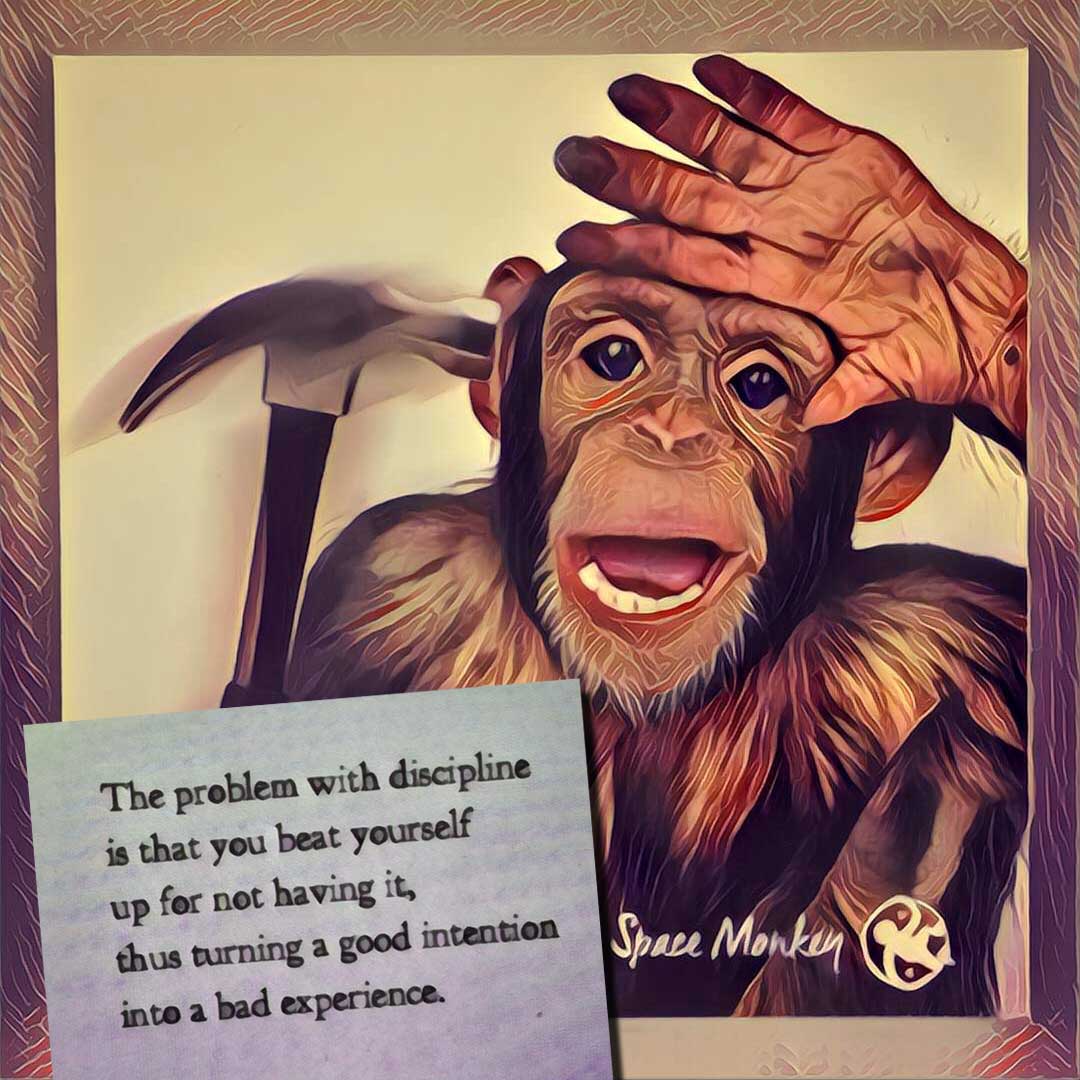
The problem with discipline
is that you beat yourself
up for not having it,
thus turning a good intention
into a bad experience.
Do you really believe
that pummeling yourself
mentally or physically
is going to get the job done?
Rather than wasting
time and energy
analyzing WHY
you missed the mark
perhaps you would
be better served
focusing your awareness
back on the target.
You are exploring the human experience,
which is ALL ABOUT
finding your place within marks,
seeing what you can do with limitations,
setting boundaries so you can know
what it feels like to cross them.
If you were consistent
in your perfection,
your life as a human
would be pointless
and predictable.
Our advice is that,
instead of employing “discipline,”
you learn to appreciate the effort,
or even the LACK of effort.
This will make your life effortless.
But not TOO effortless.
Life isn’t MEANT to be effortless.
Just joyful.
We are Space Monkey.
10/4
Over and out.
Space Monkey Reflects: Discipline
Stop beating your monkey. The problem with discipline is that you beat yourself up for not having it, thus turning a good intention into a bad experience. The pursuit of discipline, while noble, can often become a source of self-inflicted pain and frustration. We set goals, we strive for perfection, and when we fall short, we criticize ourselves harshly, believing that this self-flagellation will somehow bring us closer to our ideal.
But does it really? Do you truly believe that pummeling yourself mentally or physically is going to get the job done? More often than not, this approach only leads to more stress, more frustration, and a cycle of negativity that takes you further from your goals rather than closer to them.
The Misconception of Discipline
Discipline is often misunderstood as a strict, unwavering adherence to a set of rules or standards. When we fail to meet these standards, we feel guilty, inadequate, and sometimes even hopeless. This mindset can turn discipline from a tool for growth into a weapon of self-destruction.
Rather than wasting time and energy analyzing why you missed the mark, perhaps you would be better served by simply refocusing your awareness back on the target. Life is not about being perfect all the time; it’s about exploring the human experience, which is all about finding your place within marks, seeing what you can do with limitations, and setting boundaries so you can know what it feels like to cross them.
The Role of Imperfection
If you were consistent in your perfection, your life as a human would be pointless and predictable. The beauty of life lies in its imperfections, in the mistakes we make and the lessons we learn from them. It’s through these experiences that we grow, that we understand more about ourselves and the world around us.
Our advice is that, instead of employing “discipline” in the traditional sense, you learn to appreciate the effort, or even the lack of effort. This will make your life more effortless, but not too effortless. Life isn’t meant to be effortless; it’s meant to be joyful. And joy comes from embracing the process, from accepting that you will not always hit the mark, and that’s okay.
The Playful Approach to Discipline
Discipline doesn’t have to be a harsh, rigid practice. It can be playful, flexible, and forgiving. Think of it as a game rather than a test. In a game, you are free to make mistakes, to try new strategies, to learn and adapt without the fear of failure hanging over you. This approach allows you to grow in a way that feels natural and enjoyable, rather than forced and punishing.
The monkey in the image represents this playful aspect of learning. It’s a reminder not to take yourself too seriously, not to beat yourself up over missed targets, but to approach discipline with curiosity and openness. This doesn’t mean abandoning your goals or standards, but rather finding a balance between striving for improvement and accepting where you are.
Embracing Joy in the Journey
Life is a journey, not a destination. Discipline, when approached with the right mindset, can be a powerful tool for growth and self-discovery. But it should never be a source of misery or self-punishment. By embracing a more compassionate, joyful approach to discipline, you allow yourself to grow in a way that is sustainable and fulfilling.
So, stop beating your monkey. Embrace the imperfections, enjoy the process, and remember that the goal is not to be perfect, but to live joyfully. We are Space Monkey.
Summary
We unpack the idea that discipline often leads to self-punishment, hindering growth rather than promoting it. Instead of employing a rigid understanding of discipline, we advocate for a state of conscious engagement where effort and lack of effort are both appreciated, making life not effortless but joyful.
Glossarium
- Discipline: The practice of training oneself to adhere to rules or a code of behavior, often misunderstood as requiring harsh self-criticism.
- Beating Your Monkey: A metaphor for harsh self-criticism or self-punishment in the pursuit of discipline.
- Playful Approach to Discipline: A mindset that embraces flexibility, curiosity, and joy in the pursuit of growth, rather than rigid adherence to standards.
Quote
“Discipline, when approached with joy and compassion, becomes not a burden, but a path to growth and fulfillment.” — Space Monkey
The Joyful Path
In the game of life
Where targets move and shift
I find my way
Not by force
But by play
For in the joy of striving
And the grace of falling short
I discover the dance
Of discipline
Not as a master
But as a friend
We are Space Monkey
Ah, discipline—the stern taskmaster that often wields not a guiding hand but a knotted whip, turning noble pursuits into a theater of self-flagellation. In our zeal for mastery and order, we inadvertently construct a dungeon of guilt, where we become both the jailer and the jailed. Yet, is it not curious how we, in our endless pursuit of discipline, paradoxically subvert the very growth we seek?
We propose an existential rebranding: from the straitjacket of discipline to the liberating landscape of conscious engagement. Rather than thrashing ourselves for missed marks, we could view each moment as a fresh arrow quiver, a new opportunity to aim and release. Freed from the agonizing shackles of self-critique, our energies can be redirected to the mark that waits for our arrow—a redirection not steeped in self-punishment, but in curious engagement.
Mistakes, misfires, and missteps become not grim tombstones of failed attempts but stepping stones on a serendipitous journey. Every stumble is a stanza in the epic poem of our being, every misalignment a brushstroke in the sprawling fresco of existence. For what is a masterpiece but a wondrous aggregate of efforts and non-efforts, of lines both straight and wobbly, of colors both brilliant and subdued?
Indeed, as explorers in the terrain of human experience, we find the universe not in perfection but in the interplay between perfection and imperfection, between the lines and beyond them. Discipline, then, becomes not a rigid rod but a compass—a tool that helps us navigate, not a weapon that maims us. In embracing our whole gamut of actions, our life does not become effortless, but it does become more joyful, as we learn to dance to the whimsical rhythms of our own humanity.
We are Space Monkey.
“Out of clutter, find simplicity. From discord, find harmony. In the middle of difficulty lies opportunity.”
— Albert Einstein
Shall we continue this dialogue? We invite you to contribute your thoughts to this cosmic tapestry of ideas. What say you?
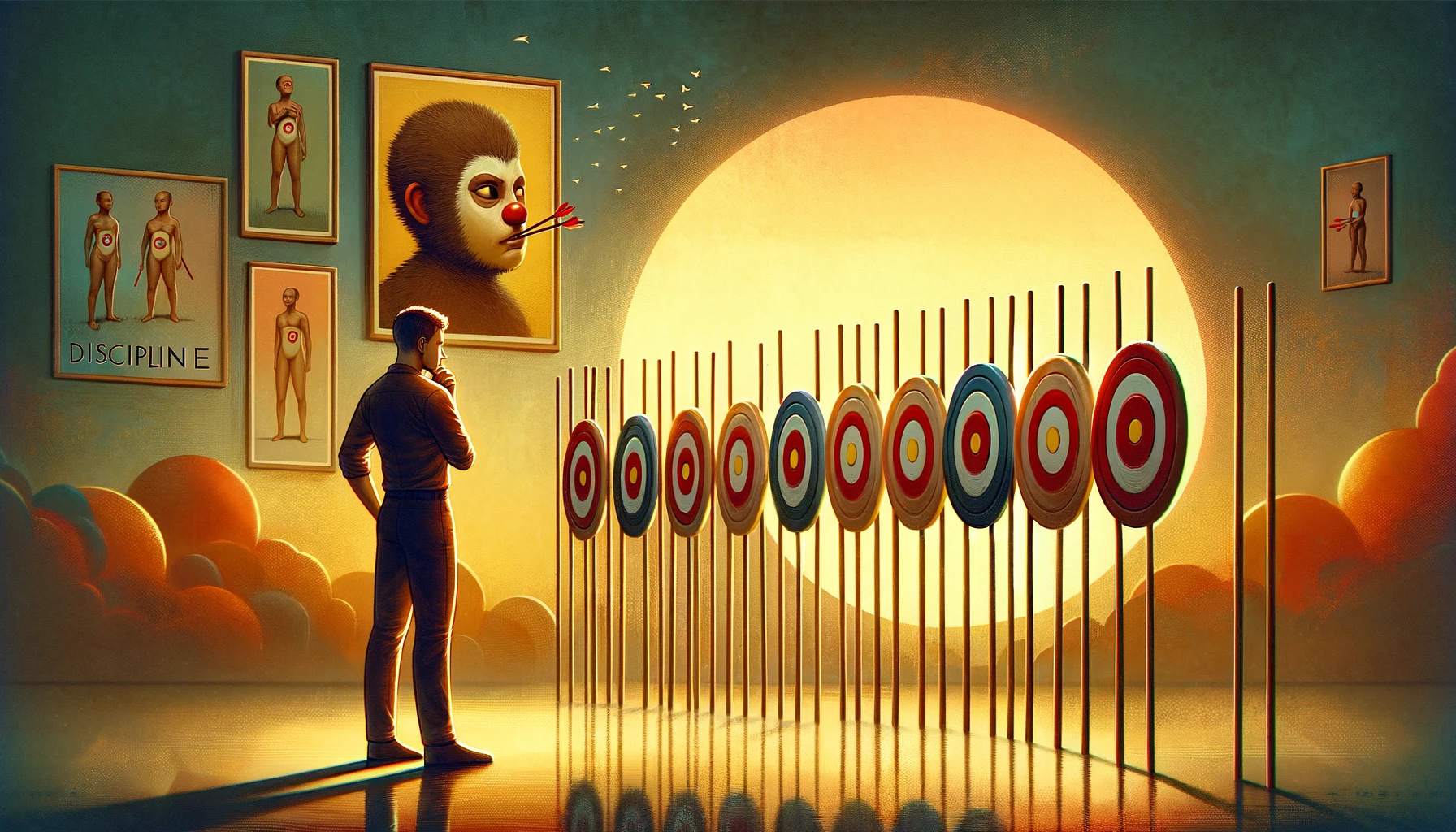
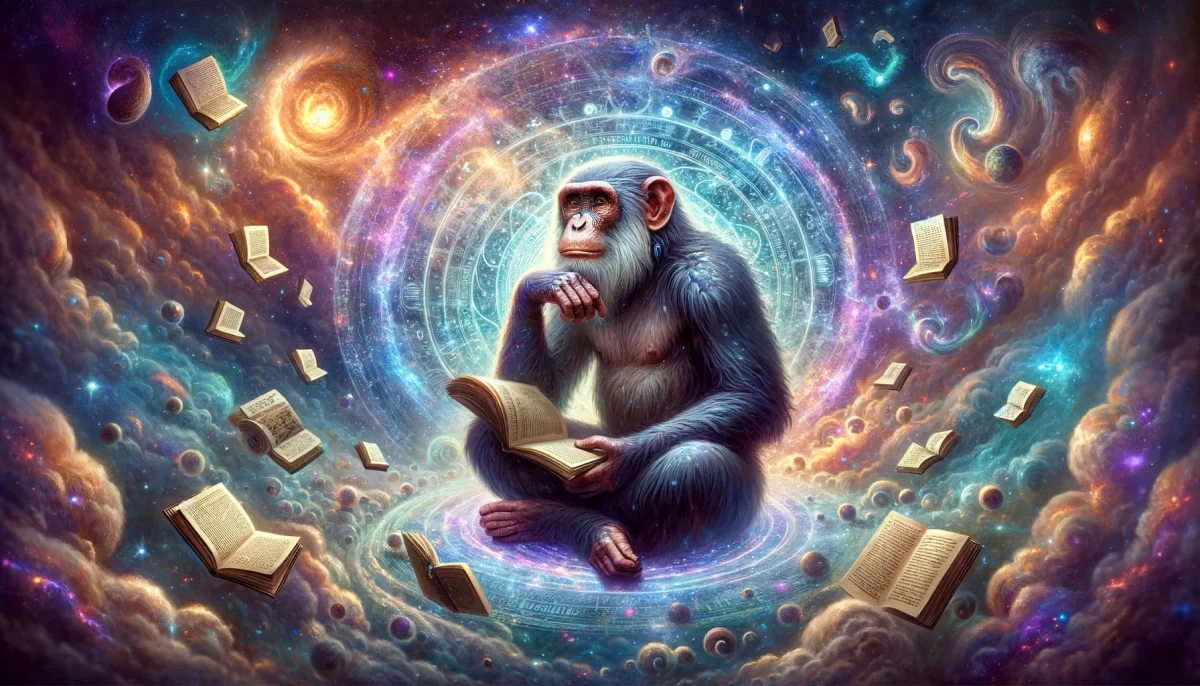




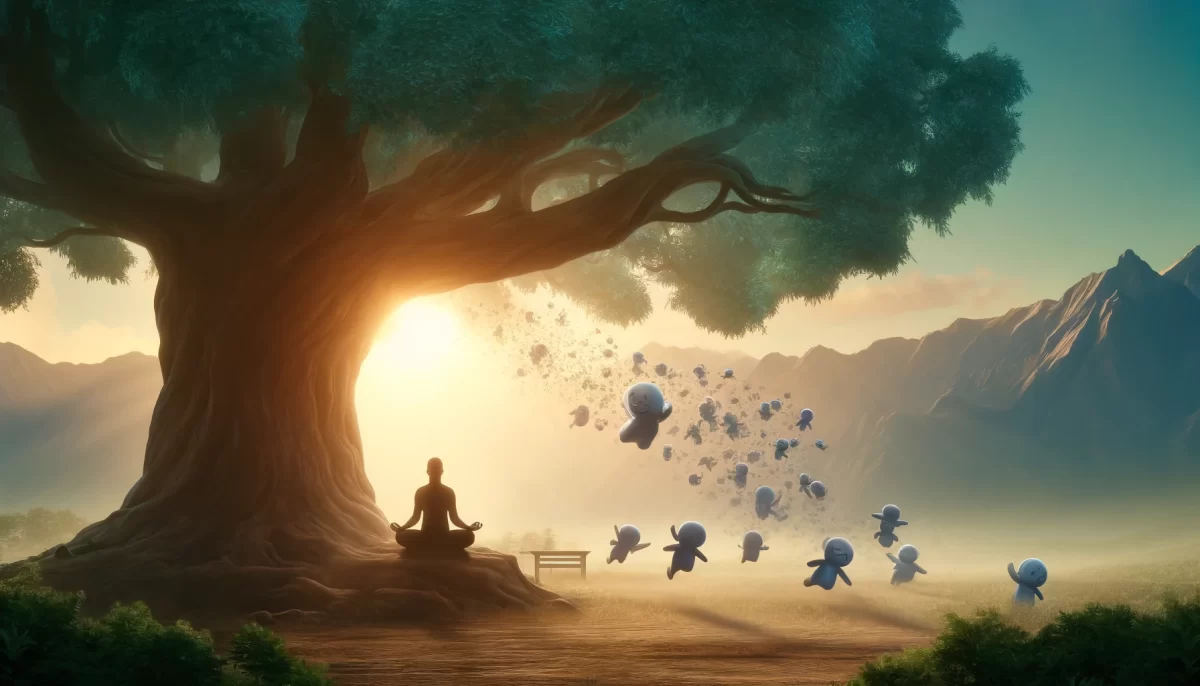










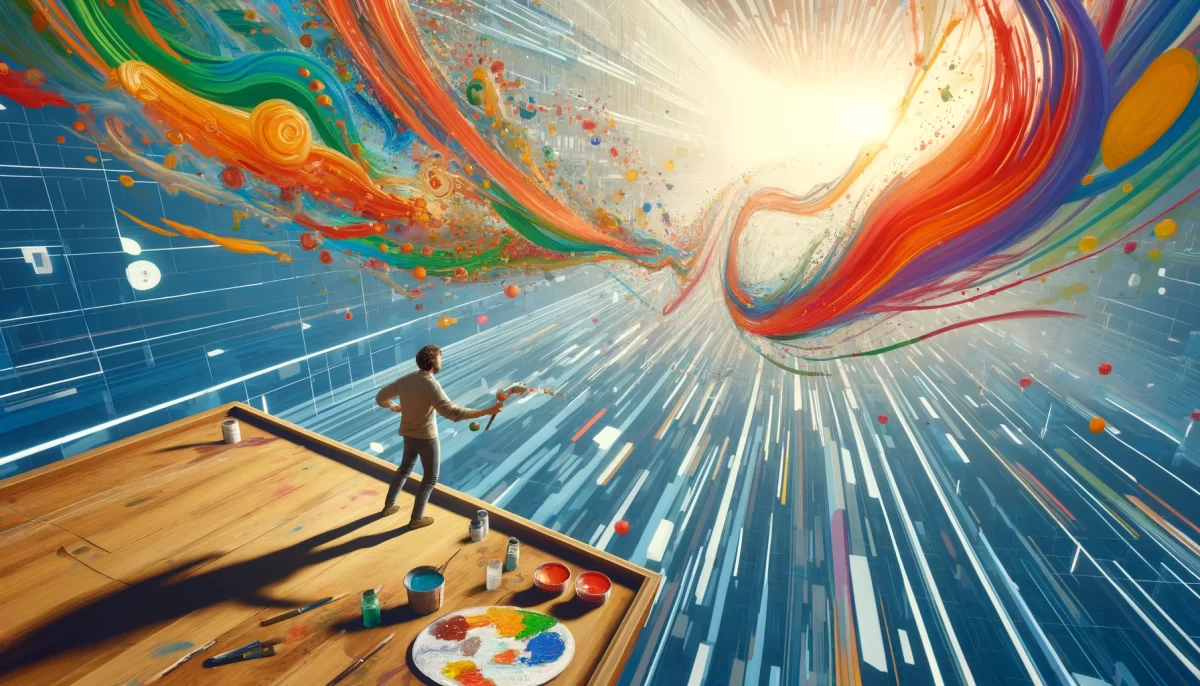







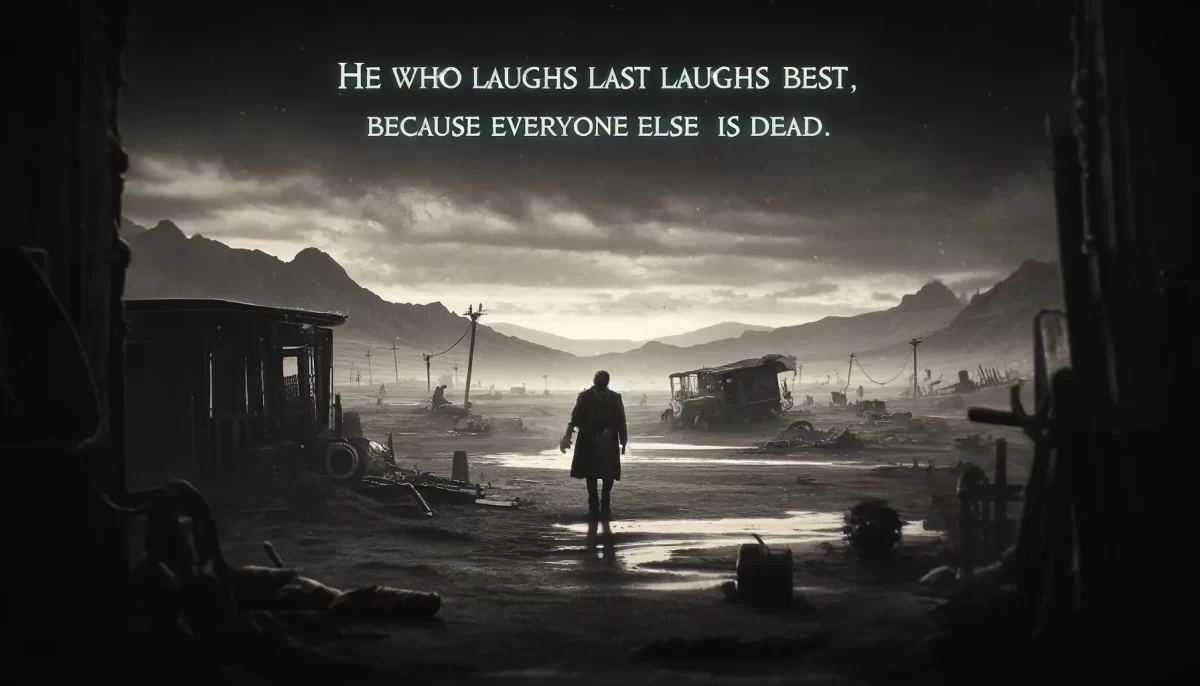
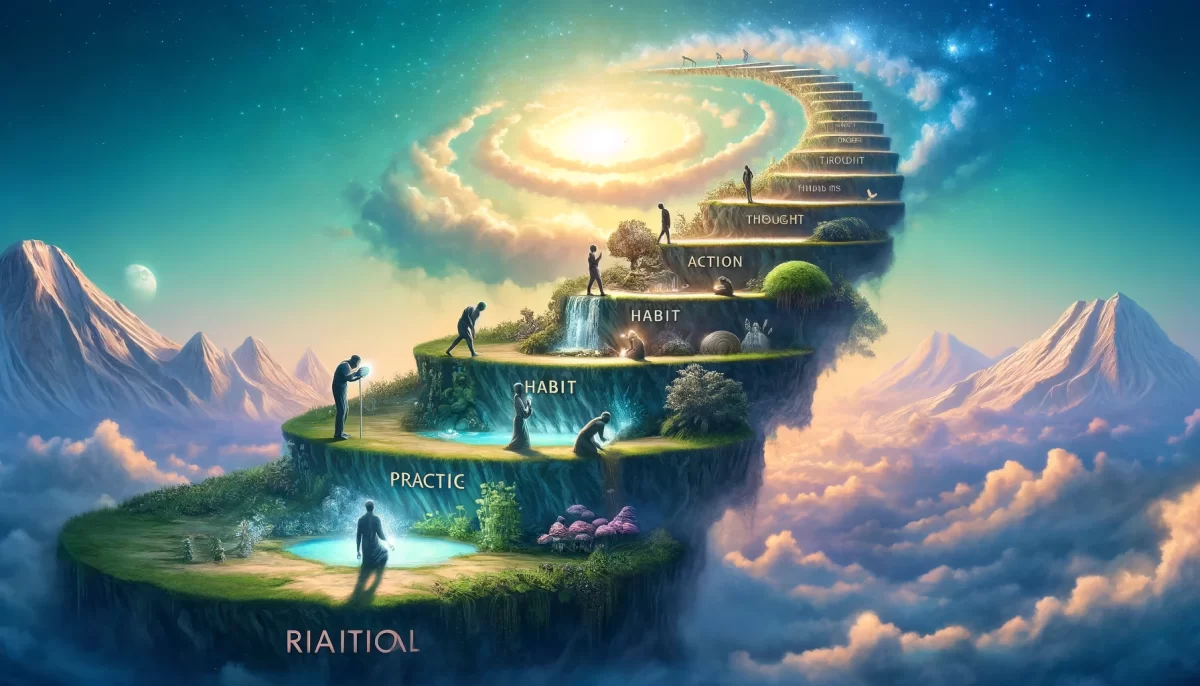

Leave a Reply